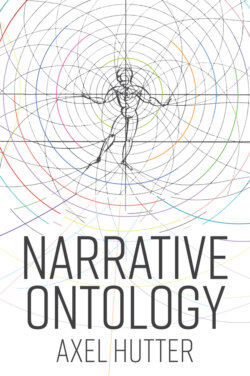Читать книгу Narrative Ontology - Axel Hutter - Страница 29
The Narrative Decentring of the I
ОглавлениеOf Reuben, Joseph’s oldest brother, the Joseph novel narrates: ‘He was not unique in this world in misjudging the importance of the question that asks who someone is, in whose footsteps he walks, on what past he bases his present, in order thereby to establish his real identity’ (53). Here the question concerning oneself, the striving for self-knowledge, takes on the shape of the genuinely narrative question: in whose footsteps does one walk? To which past does one, or ought one, to relate one’s present, in order to be able to designate and understand it as reality?
In the life stories narratively unfolded by the Joseph novel in time and language, there is a clear awareness of a narrative and historical dimension that enables the I to gain distance to its respective here and now: the horizon of its immediate experiences expands and it gains the capacity to experience a unity of meaning that reaches beyond ‘the immediate and actual reference’. This narrative decentring opens, then, the possibility of relating one’s own respective present to an underlying past, and of understanding it as a meaningful reality in the double aspect of being and meaning.
This leads, however, as the narrator of the Joseph novel expressly discusses and highlights, to the central question that has the power of fundamentally challenging our everyday understanding of the world and ourselves: ‘Is the human I something closed sturdily in on itself, sealed tightly within its own temporal and fleshy limits? Do not many of the elements out of which it is built belong to the world before and outside of it? And is the notion that someone is no one other than himself not simply a convention that for the sake of good order and comfortableness diligently ignores all those bridges that bind individual self-awareness to the general consciousness?’ (94).
This central question is to be pursued here in the form of a philosophical interpretation of the Joseph novel that, again, sets itself the task of speaking not so much about the novel but, rather, about that of which the novel itself speaks. In other words, an attempt will be made to reflect primarily not upon Thomas Mann and his texts, but rather upon what he himself reflects upon in his texts. To the same degree that there are differences between the genuine logic of literary reflection and the genuine logic of philosophical reflection, so there is agreement between both forms of reflection in their critical approach to putting into question conventions for ‘good order and comfortableness’ of everyday consciousness.
The reflections pursued here seek in this way to unfold argumentatively – step by step, in an independent manner – the exceedingly complex thought of a narrative decentralized I in Thomas Mann’s novel, so that not only its manifold aspects are made conceptually explicit but, beyond that, the reasons for a radically changed self-interpretation of human being become clear.
The human self in the Joseph novel turns out not to be ‘solidly encompassed, but, as it were, stood open to the rear, overflowed into earlier times, into areas beyond his own individuality’ (94). To adequately understand this thought, it will be crucial to elaborate its partly explicit, partly implicit, philosophical background. Only in this way will this thought be protected from the convenient deception that we are dealing merely with a ‘poetic’ – and, thus, theoretically insignificant – idea.
Taking the place of the usual interpretation of the world and the self, which objectifies the human I into a ‘graspable thing’ sealed in on itself, there will have to be a new interpretation of the self and the world in which the previously closed and isolated I now recollects the manifold ‘relations’ that lead it beyond its narrow ‘temporal and fleshy limits’. Since every human self-understanding is accompanied, however, by a corresponding understanding of the world, a narrative critique of everyday consciousness leads not only to a new temporal and historical conception of the human I, but, equally, to a ‘revolution’ in the understanding of being.
